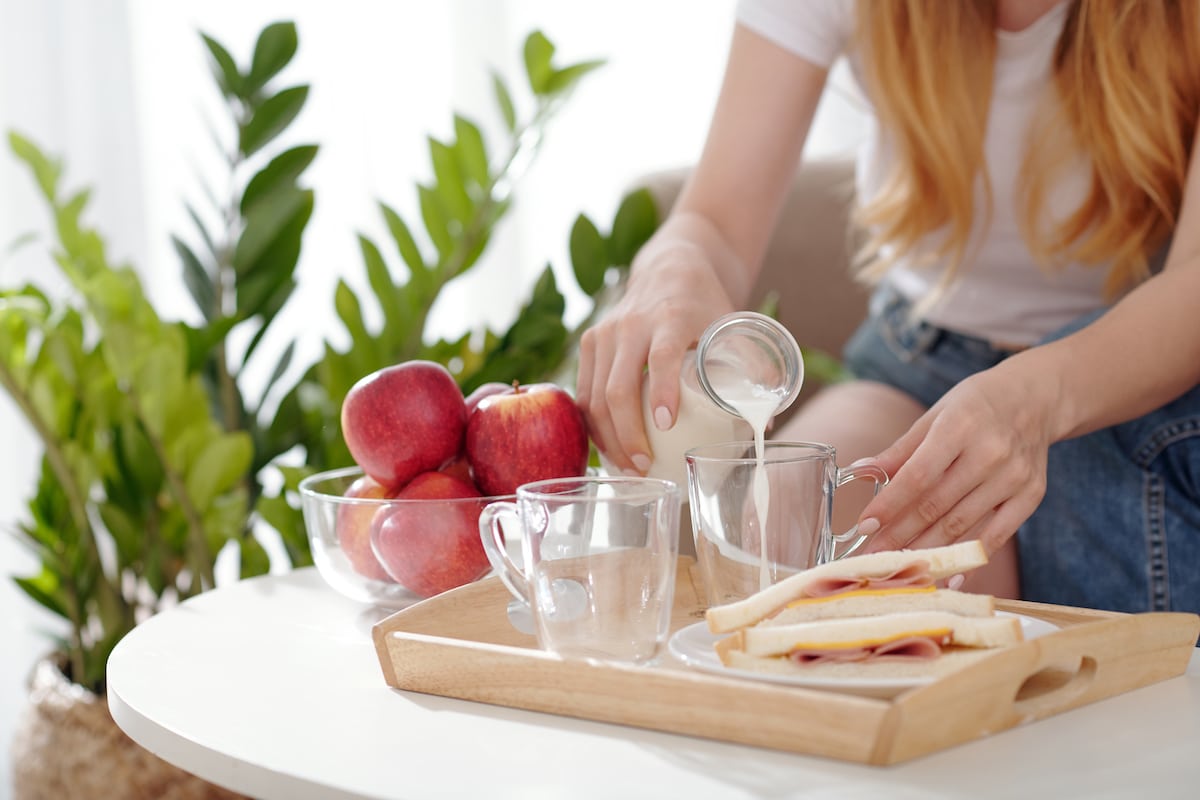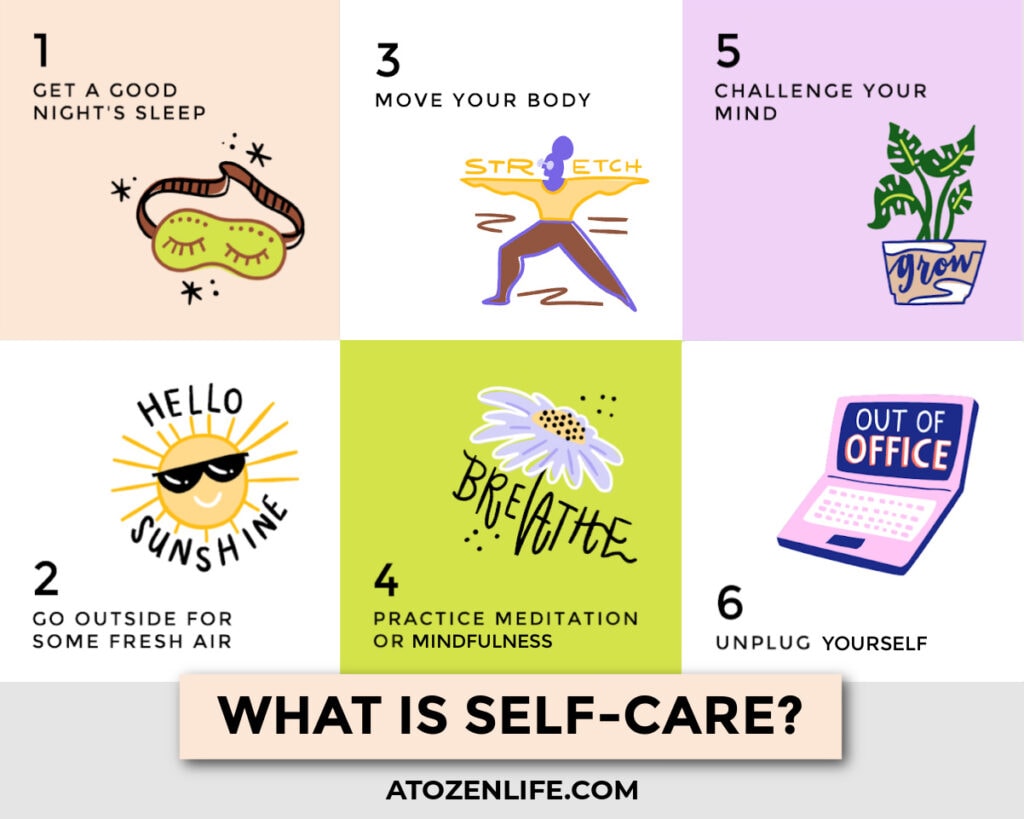What is Self-Care? 20 Benefits & Examples of Good Self-Care
This post may contain affiliate links for your convenience. That means that if you make a purchase, I will receive a small commission at no extra cost to you. Read more here.
Self-care involves nurturing our physical, mental, and emotional well-being through activities that promote personal growth, rejuvenation, and self-love. In today’s fast-paced and demanding world, taking care of ourselves has become more important than ever.
One of the problems with self-care is that for people who know there’s work to be done, mouths to be fed, errands to be run, and bullet points that need to be checked off of endless to-do lists, self-care can start to feel like just another chore.
Or worse, a self-indulgence that makes you feel guilty for spending time taking care of yourself!
However, it’s important to know that self-care is not selfish but necessary to live a balanced and fulfilling life. In fact, the National Insitute of Mental Health states that self-care plays an important role in maintaining mental and physical health, which are essential to your overall quality of life.
So what is self-care, and how can you create good self-care habits for health, happiness, and success? This comprehensive guide will delve into the meaning of self-care and will provide you with twenty self-care examples to incorporate into your daily routine.

What is self-care?
Self-care has become such a popular buzzword that its true meaning often gets lost in the glitz and glamour of social media and marketing. But self-care is so much more than green smoothies and 10-step skincare routines.
To understand self-care, it’s essential to recognize its core priciples.
Self-care is about taking time to nurture and care for oneself so you can be your best self and live your best life. It involves activities that promote physical, emotional, mental, and spiritual health.
The Oxford Languages Dictionary defines self-care thus:
Self-care (noun)
- The practice of taking action to preserve or improve one’s own health.
- The practice of taking an active role in protecting one’s own well-being and happiness, in particular during periods of stress.
It’s important to note that self-care is a very individualized experience – what works for one person may not work for another. Experimenting with different strategies can help you build the right toolkit of self-care habits that feel best to you.
20 Examples of self-care
Now that you know what self-care is, here are 20 examples of self-care to create daily habits for holistic health and wellness.
What are my favorite self-care habits? Find out in this video!
1. Get a good night’s rest
Sleeping enough is crucial for our bodies and minds to function optimally. Ideally, you should aim to get 7-9 hours of quality sleep each night by establishing a consistent bedtime routine and creating a calm sleep environment.
2. Engage in regular exercise
Exercise benefits our physical health, boosts our mood, and reduces stress. Find a form of exercise you enjoy, whether its walking, yoga, dancing, or swimming, and make it a regular part of your routine.
3. Have an attitude of gratitude
Cultivating gratitude shifts our focus from what’s lacking to what we have, promoting a positive mindset. Start a gratitude journal, list three things you’re grateful for daily, or express gratitude to others.
4. Set clear boundaries
Learning to say “no” and setting boundaries is essential for protecting your time, energy, and emotional well-being. Prioritize your needs and communicate them assertively to maintain a healthy balance in your relationships.
5. Eat a well-balanced diet
Fueling your body with nutritious meals is an act of self-care. Incorporate fruits, vegetables, whole grains, and lean proteins into your diet, and stay hydrated by drinking plenty of water.

6. Turn off notifications and unplug
Constant exposure to screens can lead to mental and emotional exhaustion. Take regular breaks from technology, engage in offline activities, and set designated tech-free hours to give your mind a chance to unwind.
7. Connect with warm relationships
Nurturing meaningful relationships with family and friends is crucial for our emotional well-being. Spend quality time with loved ones, engage in meaningful conversations, and make an effort to strengthen your social support network.
One study found that the happiest people in the world are the ones with strong and positive relationships (and they also live the longest, which is an added bonus.)
8. Find a hobby that you enjoy
Discover activities that bring you joy and engage your creativity. It could be watercolor painting, playing a musical instrument, gardening, or writing. Engaging in hobbies allows you to tap into your passions and unwind at the same time.
9. Go outside
Spending time in nature can profoundly affect our mental and physical well-being. Take a walk in the park, go hiking, or sit in your backyard to soak up the benefits of fresh air, sunshine, and natural surroundings.
10. Practice mindfulness or meditation
Taking time to be present and calm your mind can profoundly impact your well-being. Engage in mindfulness or meditation practices daily to reduce stress, increase self-awareness, and promote inner peace.

11. Challenge your mind
There are so many ways to challenge and engage your mind. Read books, take classes, learn a new language, solve puzzles – the possibilities are endless! Find activities that speak to your interests and that push your mental boundaries.
12. Schedule downtime and rest
Taking short breaks can help restore focus and prevent burnout when overwhelmed or engaged in prolonged tasks. Step away from your work, stretch, take deep breaths, or do a quick mindfulness exercise.
READ MORE: 25 Tips to Slow Down and Enjoy Life to the Fullest
13. Set realistic goals
Break larger goals into smaller, achievable tasks to avoid feeling overwhelmed. Celebrate your accomplishments along the way, and be kind to yourself if you encounter setbacks.
14. Write or say daily affirmations
The way you speak to yourself matters! Become aware of your inner dialogue and replace negative self-talk with positive affirmations. Encouraging and supportive self-talk can boost your self-esteem and create a nurturing internal environment.
15. Declutter your home and life
A cluttered environment can contribute to feelings of stress and overwhelm. Dedicate time to decluttering your home and organizing your living or workspace, creating a more peaceful and inspiring environment.
Remember, decluttering isn’t just about getting rid of physical items; clutter can also be mental, emotional, or financial. Remember, clutter isn’t just the stuff on your floor but anything that stands between you and the life you want to be living.

16. Ask for help
Recognize when you need support, and don’t hesitate to ask for it. Reach out to friends, family, or professionals when you’re feeling overwhelmed or are struggling.
17. Practice self-care rituals
Create a self-care routine that works for you. It could involve journaling, taking a nature walk, practicing yoga, or enjoying a cup of tea in solitude. Incorporate these rituals into your daily or weekly schedule.
18. Smile and laugh
Did you know that people tend to smile less as they get older? It’s called the “humor cliff,” and according to new research, most of us go over the edge around age 23 – yikes!
That’s why finding things that make you smile or tickle your funny bone is important. Laughter is a powerful stress reliever. Engage in activities that bring joy and laughter, such as watching a comedy show, playing games with friends, or sharing funny moments with loved ones.
19. Stop procrastinating
Procrastination can lead to overwhelming feelings of guilt and stress. The longer you avoid doing something, the harder it is to get it done, so it’s better to take care of it sooner rather than later.
Break tasks down into manageable chunks, set realistic goals, and take action. Resolve to take one step at a time and be mindful of how you’re spending your time.
20. Quit comparing yourself to others
Comparison often leads to feelings of inadequacy and self-doubt. Be mindful of your thoughts, recognize when you’re engaging in comparison, and focus on the unique skills, talents, and attributes that make you YOU.
Remember that everyone is on their own journey – celebrate your success without comparing it to anyone else’s.
READ MORE: 5 Ways Comparison is the Thief of Joy

Final ideas about self-care
Prioritizing self-care is not selfish; it is an essential practice that allows us to show up as our best selves in all areas of life. By integrating these 20 self-care habits into your routine, you can cultivate a healthier and more fulfilling lifestyle.
Remember, self-care is a continuous journey that requires attention and commitment. Start small, be consistent, and be kind to yourself along the way. Your well-being deserves the investment.
Read this next:
